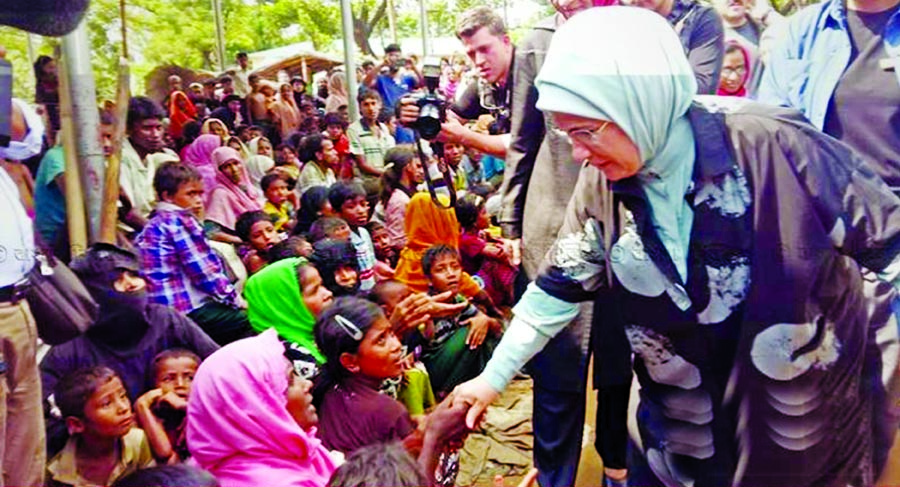
A Turkish delegation led by First Lady Emine Erdogan on Thursday visited a refugee camp at Kutupalong under Ukhia upazila in the southeastern Cox’s Bazar district to see the condition of Rohingyas those have fled violence-torn Myanmar’s Rakhine state.
The First Lady along with the delegation, including Turkish Foreign Minister Mevlut Cavusoglu, a couple of Turkish politicians and heads of Turkish aid agencies, also visited an adjacent unregistered camp.
“I have witnessed the situation in the camp. I will discuss it with the Turkish President. The matter will be placed in the next UN General Assembly,” Emine Erdogan said. She also talked to some bullet injured Rohingyas who were shot by the Myanmar army.
“The killings of Muslims by the Myanmar army are inhuman and heartbreaking. The Turkish nation will stay besides the depressed Rohingyas,” she said.
Official sources said, the Turkish team comprises Family and Social Affairs Minister Fatma Betül Sayan Kaya, ruling Justice and Development Party [AK Party] Istanbul Deputy Ravza Kavakçi Kan, president of the state-run Turkish Cooperation and Coordination Agency [TIKA], Serdar Çam, Turkish Red Crescent [Kizilay] Director Ibrahim Altan and heads of other non-governmental organizations.
Erdogan’s youngest son Bilal Erdogan also accompanied her mother during the visit.
Besides, Bangladesh Foreign Minister Abul Hassan Mahmood Ali, State Minister for Foreign Affairs Shahriar Alam, Deputy Commissioner of Cox’s Bazar and senior government officials were present at that time.
The Turkish First Lady and the foreign minister were scheduled to meet Prime Minister Sheikh Hasina yesterday evening to discuss the ongoing Rohingya crisis with a view to finding a solution to the humanitarian crisis.
Earlier, a special chartered aircraft carrying Emine Erdogan and her entourage landed at Shahjalal International Airport in Dhaka around 3:00am where State Minister for Foreign Affairs Md Shahriar Alam received her.
Recently, Turkish President Recep Tayyip Erdogan has accused Myanmar of “genocide” against the Rohingya Muslim minority. “There is a genocide there. Those who close their eyes to this genocide perpetuated under the cover of democracy are its collaborators,” Erdogan said in a speech in Istanbul during the Eid al-Adha feast.
Tayyip Erdogan also phoned to Bangladesh President Abdul Hamid on August 31 night over the current state of the Rohingya crisis. The Turkish President supported measures taken by Bangladesh over the Rohingya refugee and assured Hamid of full support and cooperation along with raising the issue at different international forums in a bid to send back the refugees to Myanmar.
On the other hand, Iranian President Hassan Rouhani has condemned Myanmar’s “brutal crimes” against Rohingya Muslims, calling on the Southeast Asian country’s leaders to immediately end the “inconceivable ethnic cleansing” of the religious minority.
“We are all aware of the plight of Rohingya Muslims. Tens of thousands-nearly 100,000- of people are either displaced or killed; their corpses are set on fire and so are their homes. We call on the Myanmar government to end these brutal crimes and stop the army’s ongoing rampage,” Rouhani said recently.
Iran’s Foreign Minister Mohammad Javad Zarif also discussed the matter with Turkish, Malaysian and Indonesian leaders and is planning more meetings with his counterparts in other Islamic countries, according to media reports.
Meanwhile, Bangladesh government has taken initiatives to get necessary papers of the Rohingya refugees after Myanmar government announced not to take back its nationals without valid documents.
A senior official of the Ministry of Foreign Affairs requesting anonymity told The New Nation on Thursday that the refugees entered Bangladesh recently have brought necessary papers, including proof of their residing in Myanmar.
“We’re enlisting the new refuges and collecting the papers. It will be considered as a proof of resident, if anyone has electricity or gas bill, money receipt of buying anything, tuition fee receipt of any school or college, etcetera,” the official said.
Myanmar’s National Security Adviser U Thaung Tun has announced that people who fled to Bangladesh from the fighting in Rakhine state will not be allowed back in without proof of citizenship.
“Citizens must have proof of how many years they have lived in Myanmar. If their papers are authentic, they can come back. But it will not be possible, if they are not a Myanmar citizen,” he told a news conference on Rakhine at the State Counsellor’s Office on September 6.
Violence broke out in the Rakhine state after Myanmar military launched an operation against Rohingya Muslims, forcing at least 125,000 people, including women and children, to flee and seek refuge in Bangladesh since August 25, when Rohingya insurgents attacked dozens of police posts and an army base.
The United Nations documented mass gang-rape, killings-including infants and young children –, brutal beatings and disappearances of the Rohingyas. The ensuing clashes and a military counter-offensive have killed at least 400 people.

